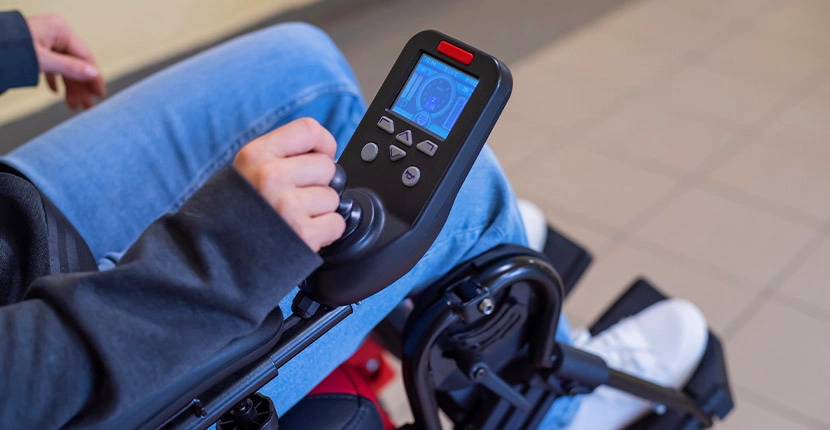Electric Wheelchair and Mobility Scooter Batteries: Everything You Need to Know
- by Joe Weber - updated on 4/11/2025

Electric wheelchairs and mobility scooters offer essential independence to millions of Americans. But just like any device, its performance depends on one key component: the battery. If your mobility device isn't holding a charge like it used to, it might be time for a replacement. Here's what you need to know about electric wheelchair and mobility scooter batteries and maintenance, and how to choose the right power source to keep you moving.
How Electric Wheelchairs and Mobility Scooter Batteries Work
Most mobility devices operate on a 24-volt system powered by two 12-volt deep cycle sealed lead-acid (SLA) batteries. These batteries are designed for long-lasting, consistent energy, making them ideal for daily travel, errands, and everyday use.
Whether you use a power chair, a 3-wheel or 4-wheel mobility scooter, the battery type you choose can have a major impact on runtime, recharge time, and overall lifespan.
AGM vs. Gel Batteries for Electric Wheelchairs and Mobility Scooters
The two most common SLA battery types for mobility devices are Absorbed Glass Mat (AGM) and Gel batteries. Each offers distinct pros and cons depending on how often you use your device.
AGM Batteries
AGM batteries are sealed, maintenance-free, and offer quick charging. They use fiberglass mats to contain the electrolyte and are more budget-friendly upfront.
| Pros | Cons |
|---|---|
| Lower cost | Shorter lifespan than Gel batteries |
| Faster charging | May lose charge faster when stored |
| Maintenance-free |
Best for: Occasional users or those who only need their mobility device for short trips or part-time use.
Gel Batteries
Gel batteries suspend the electrolyte in a silica-based gel, offering a longer lifespan, better performance in varying temperatures, and a slower discharge rate when not in use.
| Pros | Cons |
|---|---|
| Long-lasting | Higher initial cost |
| Handles temperature extremes better | Slower charging time |
| Holds charge well in storage |
Best for: Daily users or anyone who relies heavily on their wheelchair or scooter throughout the day.
How to Choose the Right Mobility Battery for Your Wheelchair or Scooter
When shopping for a mobility scooter battery replacement or electric wheelchair battery, ask yourself:
- How often do I use my device?
Occasional users may be fine with AGM. Frequent users should consider Gel. - Do I store my device in the garage or outdoors?
Gel batteries tend to handle temperature swings better. - Do I want less frequent battery replacements?
Gel batteries generally offer a longer lifespan with proper care.
Just as important, if not the most important:
Always follow your scooter or wheelchair manufacturer's battery guidelines.
Scooters and wheelchairs manufacturers like Pride Mobility, Drive Medical, EV Rider, and many more design their mobility scooters and wheelchairs to work with a specific battery, much like your car or truck. The required battery size, chemistry, and capacity will be listed in your owner's manual and are often easy to find on the manufacturer's website. Using the wrong type of battery could reduce performance—or worse, damage your device.
Still unsure? Visit your local Batteries Plus store, and one of our experts will walk you through your options.
Mobility Scooter Battery Maintenance Tips
Maximize your battery life with these quick tips:
- Charge regularly: Recharge your batteries after every use. Avoid letting them fully discharge.
- Use the correct charger: AGM, Gel, and lithium batteries require different charging profiles.
- Store in a climate-controlled space: Heat and cold can shorten battery life.
- Check connections: Loose or corroded terminals can impact performance.
Need help checking your batteries? We offer free battery testing in-store.
Are Lithium-Ion Batteries Safe for Mobility Scooters?
Some newer mobility scooters specifically designed for travel use lithium-ion batteries, which are lighter, smaller, and offer a longer runtime. However, they require special chargers and must be handled with care to avoid safety risks.
Always follow the manufacturer's instructions, and avoid using cheap, third-party chargers not designed for your battery type. If you're not sure what kind of battery your scooter requires, just ask—we're happy to help.
FAQ: Electric Wheelchair & Mobility Scooter Batteries
Q: How long do wheelchair or mobility scooter batteries last?
A: Typically, 1-2 years, depending on usage, battery type, and how well they're maintained.
Q: Can I replace my mobility scooter battery myself?
A: Yes, though many customers prefer to have it done professionally. Batteries Plus offers free in-store installation when you buy your replacement battery from us.
Q: What kind of battery does a mobility scooter use?
A: Most use sealed AGM or Gel lead-acid batteries. Some newer models use lithium-ion.
Q: Where can I buy wheelchair batteries near me?
A: Batteries Plus has locations nationwide with expert staff ready to help you find and install the right mobility battery for your device.
Q: Can you fly with an electric wheelchair or mobility scooter?
A: Yes, you can fly with an electric wheelchair or mobility scooter, but it's important to follow airline regulations. Most airlines allow travel with sealed AGM or Gel batteries, while lithium-ion batteries are subject to stricter guidelines, including watt-hour limits and carry-on requirements. Always notify the airline in advance.
Keep Your Mobility Moving
Whether you rely on an electric wheelchair or a mobility scooter, choosing the right battery and keeping it well-maintained is key to staying independent and on the go. If your current batteries aren't holding a charge like they used to, stop by your nearest Batteries Plus location.
We carry a wide selection of AGM and Gel batteries specifically designed for mobility devices—and we'll even install them for you while you're in the store. Let us help you get back to moving with confidence.